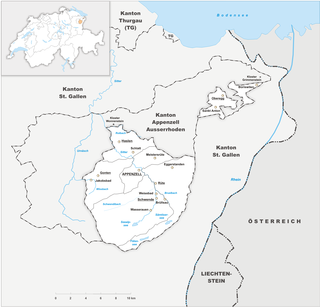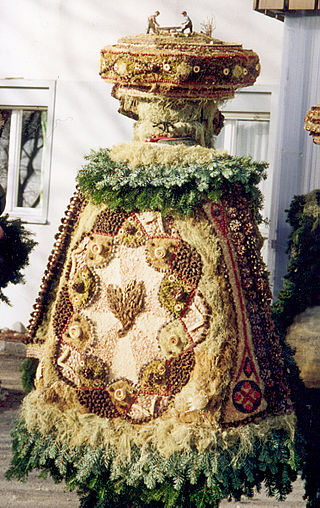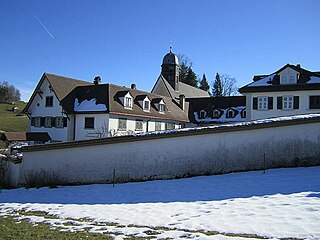
The Council of States is the upper house of the Federal Assembly of Switzerland, and the lower house being the National Council. It comprises 46 members.

Appenzell Innerrhoden, in English sometimes Appenzell Inner-Rhodes, is one of the 26 cantons forming the Swiss Confederation. It is composed of five districts. The seat of the government and parliament is Appenzell. It is traditionally considered a "half-canton", the other half being Appenzell Ausserrhoden.

Appenzell Ausserrhoden, in English sometimes Appenzell Outer Rhodes, is one of the 26 cantons forming the Swiss Confederation. It is composed of twenty municipalities. The seat of the government and parliament is Herisau, and the seat of judicial authorities are in Trogen. It is traditionally considered a "half-canton", the other half being Appenzell Innerrhoden.

Teufen is a municipality in the canton of Appenzell Ausserrhoden in Switzerland.

Trogen is a municipality in the canton of Appenzell Ausserrhoden in Switzerland. The town is the seat of the canton's judicial authorities.

Walzenhausen is a municipality in the canton of Appenzell Ausserrhoden in Switzerland.

Reute is a municipality in the canton of Appenzell Ausserrhoden in Switzerland.

The canton of St. Gallen or St Gall is a canton of Switzerland. Its capital is St. Gallen.
Oberegg District is a district in the canton of Appenzell Innerrhoden in Switzerland. It comprises three small exclaves of the canton, a few kilometers northeast of the rest of Appenzell Innerrhoden.

Appenzell was a canton in the northeast of Switzerland, and entirely surrounded by the canton of St. Gallen, in existence from 1403 to 1597.

Ballenberg is an open-air museum in Switzerland that displays traditional buildings and architecture from all over the country. Located near Brienz in the municipality of Hofstetten bei Brienz, Canton of Bern, Ballenberg has over 100 original buildings that have been transported from their original sites. It is a Swiss heritage site of national significance.

Religion in Switzerland is predominantly Christianity. According to the national survey of the Swiss Federal Statistical Office, in 2022, Christians accounted for 58.2% of the resident population, of whom 32.1% were Catholics, 20.5% were Swiss Protestants, and 5.6% were followers of other Christian denominations. The proportion of Christians has declined significantly since 1980, when they constituted about 94% of the population; during the same timespan, unaffiliated Swiss residents have grown from about 4% to 31% of the population, and people professing non-Christian religions have grown from about 1% to 7.2% of the population. In 2020, according to church registers, 35.2% of the resident population were registered members of the country's Catholic Church, while 23.3% were registered members of the Protestant Church of Switzerland.

The Capuchin Friary, Rapperswil, is a Capuchin friary located in Rapperswil in the Canton of St. Gallen, Switzerland.

The German-speaking part of Switzerland comprises about 65 percent of Switzerland.

The Rheineck–Walzenhausen mountain railway is a 1.9 kilometres (1.18 mi) long rack railway in Switzerland. It links Rheineck station, in the municipality of Rheineck and the canton of St Gallen, with the village and health resort of Walzenhausen, in the canton of Appenzell Ausserrhoden. Passenger service on the line now forms part of the St. Gallen S-Bahn, branded as the S26. The S26 is also part of the Bodensee S-Bahn.

Appenzell Railways is a Swiss railway company with headquarters in Herisau. It operates a network of railways in the cantons of Appenzell Innerrhoden, Appenzell Ausserrhoden, St. Gallen and Thurgau.

Silvesterklaus is a masked person taking part in Saint Sylvester's Day festivities in Appenzell, Switzerland, and thus contributing to maintain the Chlausen tradition. A Silvesterklaus or New Year's Mummer is dressed up as a Saint Sylvester or New Year's Eve character. In the Reformed half-canton of Appenzell Ausserrhoden, the turn of the year is still celebrated in this way. The Silvesterklausen is part of Switzerland’s intangible cultural heritage.

Wonnenstein Friary or Mary's Rose Garden Wonnenstein is a monastery of Sisters of the Third Order of Saint Francis in Teufen in the canton of Appenzell Ausserrhoden in Switzerland. While it is located in Appenzell Ausserrhoden, the buildings and grounds are a small exclave of the canton of Appenzell Innerrhoden.



















